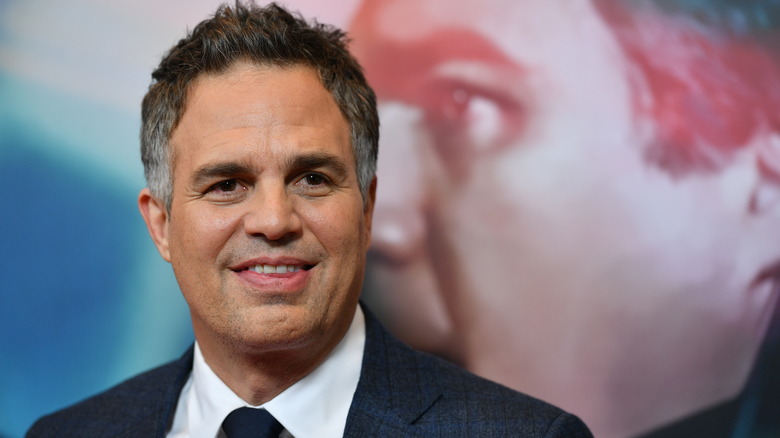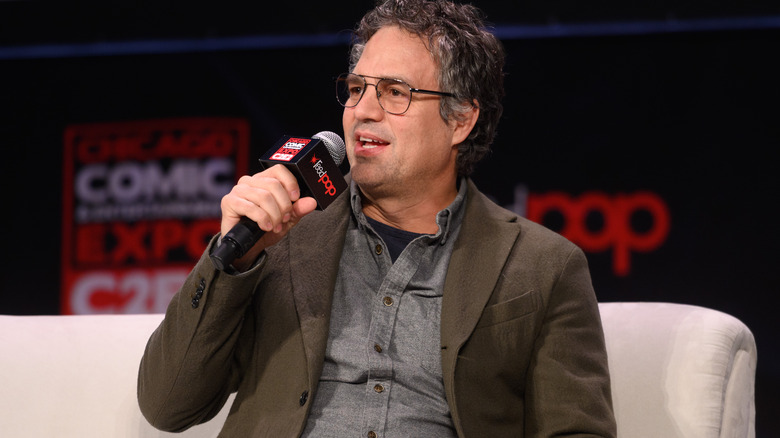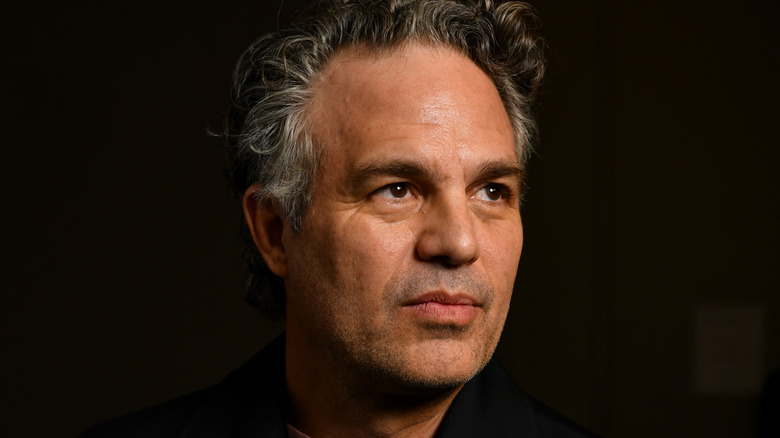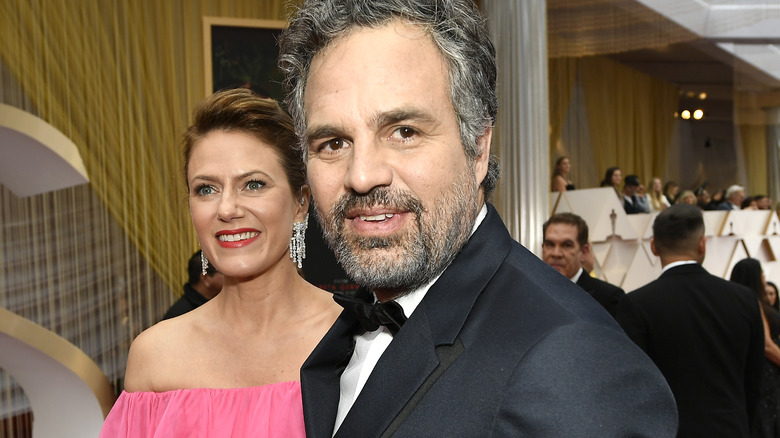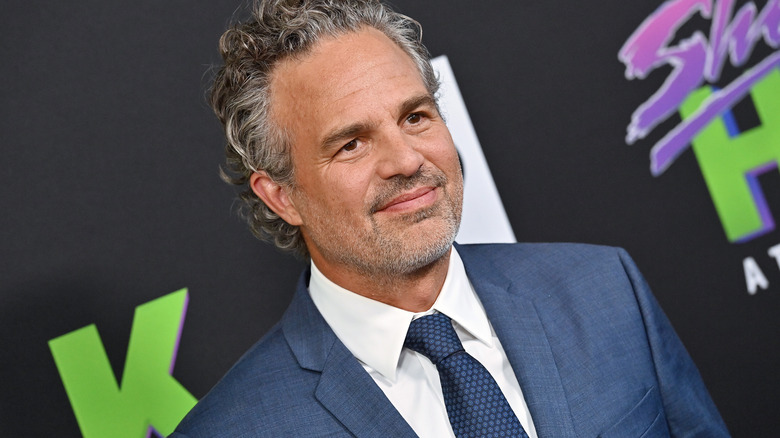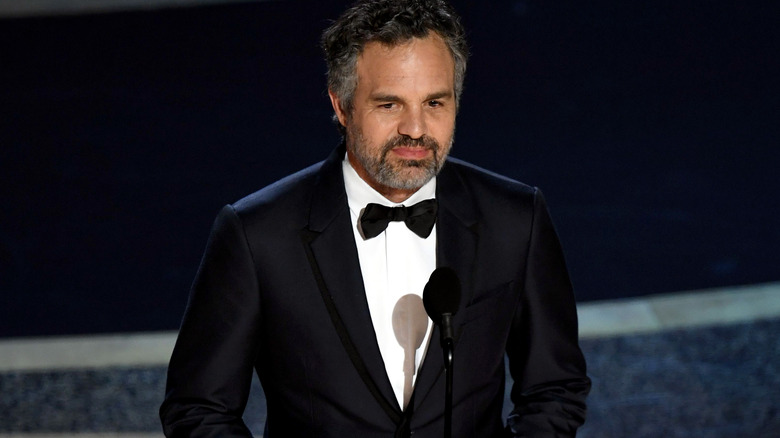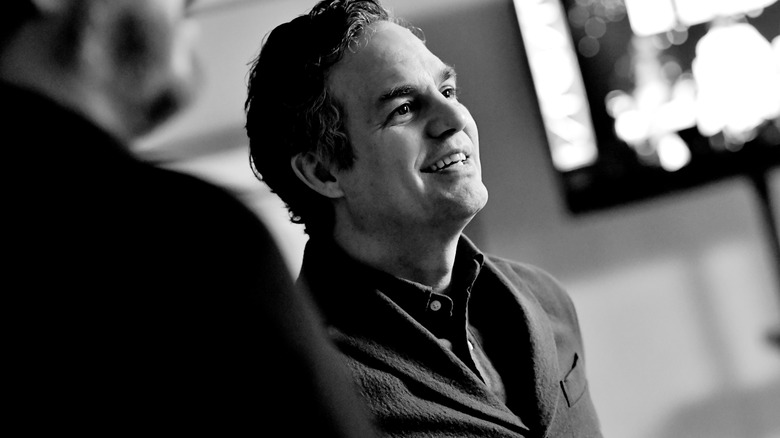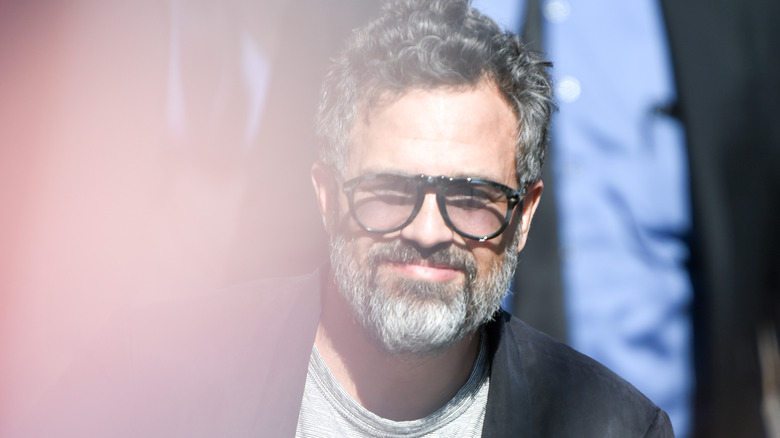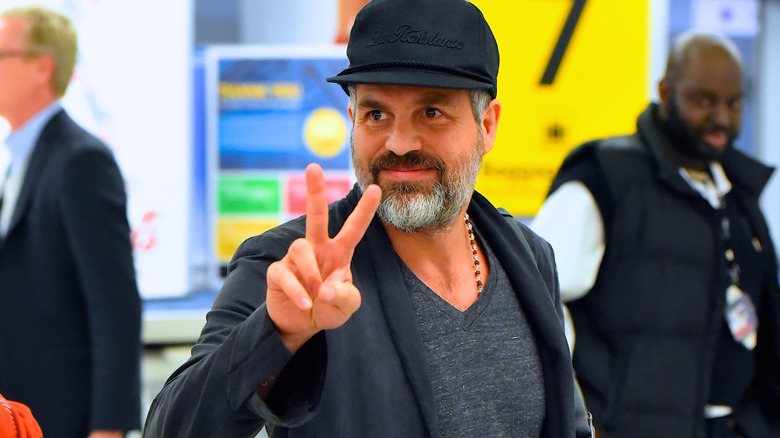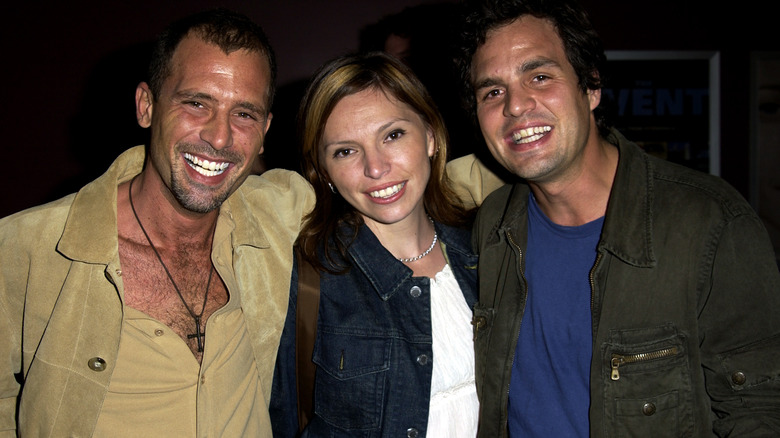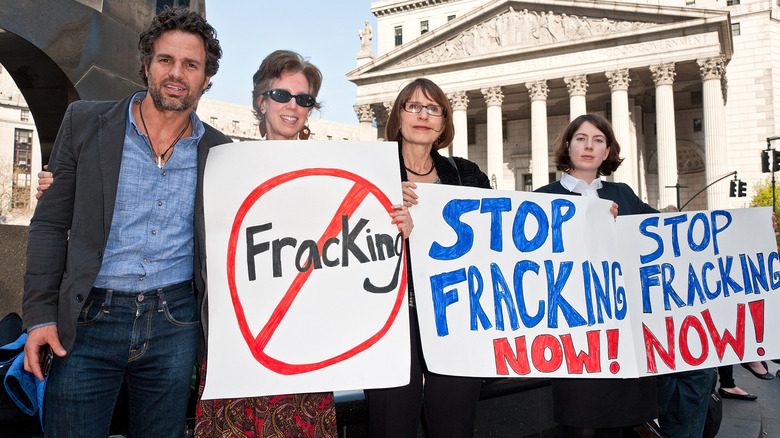Mark Ruffalo's Sad And Troubled Past
Most Hollywood A-listers seem to exist on a whole other level than the rest of us. They live in their multi-million-dollar mansions with their personal trainers, private chefs, chauffeurs, and bodyguards, and they're more often than not part of a long line of actors, directors, and other entertainment elite. Then, there's Mark Ruffalo, who seems like he just sort of wandered into the wrong room, and was just so nice that no one could quite bring themselves to ask him to leave.
It's unthinkable that most stars would worry about everyday embarrassments, like having some food stuck in their teeth, or toilet paper stuck to their shoe. But Ruffalo? Everyone knows he does the embarrassing stuff, because he does it on such a massive and public scale: He's giving away spoilers and live-streaming movie premieres, and when it happens, it seems totally on-brand for him. In other words? He's one of the ordinary people, and it's no wonder he's such a favorite.
How has he managed to hold onto that down-to-earth, everydayness that makes him so likable? It's entirely possible that it all comes because he's been through some horrible things in his life — more than seems fair. And it's heavy stuff: From extraordinary health struggles to the loss of family members in the most terrible ways, Ruffalo has had to carry a lot on his shoulders.
Undiagnosed dyslexia made school a struggle
In a video for the Child Mind Institute, Mark Ruffalo answered the question of what he would tell his younger self if he had the chance. It's heartbreaking stuff, as he shared that undiagnosed dyslexia, ADHD, and depression had made growing up difficult and school a challenge. "One of the things that was very difficult for me was grade school," he shared. "Feeling strange, and unique, and freakish. I didn't feel like I fit in anywhere. I would say ... to my younger self then that there's help, and there are ways to deal with it, and manage it, and to overcome it."
Ruffalo has since become an outspoken proponent for raising awareness for precisely those issues, tweeting for Dyslexia Awareness Month (October), and confirming to fans that yes, he has dyslexia, and no, it's nothing to be ashamed of. And that's something he's struggled with accepting himself.
In an interview for Vanity Fair, he talked about how there really is no "normal," and there shouldn't be. He shared the fact that all three of his children have also been diagnosed with dyslexia, and how it's important to him that they grow up differently than he did. "Now, we could put a lot of shame, and there's certain schooling that does put a lot of shame, on those aspects, but ... the way we're dealing with it, is to be upfront about it, accepting, and without shame. And those kids are prospering in that environment."
He had a very unsettled early life
Mark Ruffalo was born and raised in Kenosha, Wisconsin, and his early years were full of much more upheaval than his laid-back attitude might suggest. He explained to Parade: "For a long time, I felt like someone had it in for me. With every new adversity, I protested — almost to God — 'How much more of this do I have to take?'"
Ruffalo's father, Frank, owned a construction painting business, and that was at a cost: "He was away a lot when I was growing up," Ruffalo explained. "I was very lonely for him." When Ruffalo turned 13, the business went bust and they were forced to move to Virginia Beach, where another business venture also went bust. Even as he became one of the popular kids at school, and excelled in sports — particularly wrestling — he struggled: "I was miserable. This sounds sappy, but I was always aware of the frailty of human beings, the sorrow in the nature of things. I didn't know how to live in the world, how to cope. I felt like I didn't belong."
His father had also been a wrestler, and in spite of the fact that it gave father and son something to bond over, he quit, started dabbling in acting, and his life was overturned by more upheaval. The family headed to San Diego, and financial hardships took a toll that led to his parents' divorce. He described those years as full of anger, resentment, and arguments: It was a stressful way to grow up.
He's been candid about his experiences with depression
Mark Ruffalo has been refreshingly candid about his own struggles over the years, and when he sat down to talk to the Observer around the release of "Infinitely Polar Bear," he got honest about mental illness, the stigma that was still attached to it, and his own diagnosis.
"People are so afraid of mental illness, but it's everywhere. It's dysthymia. It's a long-running, low-grade depression all the time. I've been struggling with that my whole life. It's like a low-grade depression that just is running all the time in the background." That, he says, gave him some insight into part of the character he plays in the film, a father who suddenly finds himself caring for his children full-time as his wife goes back to school: And, at the same time, trying to manage his own bipolar condition.
When he spoke with Vanity Fair about the film, he revealed that he had experiences dealing with members of his own family who had been diagnosed as manic-depressive, after years of not having a name for what they were going through. What he had personally experienced was different, though: "I wish I was manic. I'm more just depressed. I don't get the fun part. So I really understood what it is to stand in front of the refrigerator with the door open and just going [sighs]. That deadened thing. I understood that."
His best friend died by suicide
Some people never find what they see as their true calling in life. For Mark Ruffalo, he knew what that calling was, but struggled to realize it. The oft-told tale that he went on hundreds of auditions before landing a part seems like it's exaggerated, but he told Movie Maker that it wasn't: "My agent said to me, 'Mark, for the average actor, it takes 100 auditions to get a job. You've had 230 and you haven't booked a job.'" By the time he did get hired, that number had skyrocketed to around 800 auditions, so ... how did he find the determination to keep going? From a very dark place.
Even as he was auditioning, auditioning, and auditioning some more, he was getting some experience on stage, in unpaid roles at various theaters. Then, he found himself faced with tremendous loss, as the friend who had been his best friend for years died by suicide.
"Michael was my dearest friend," he told Parade. "He was the only one I knew as sad as me, who I could talk to. When he died, it rocked me out of a dark depression. The moment he left, I realized that death wasn't an escape, that suicide wasn't an answer. I understood the value of life. Acting became my way of addressing it."
There's a reason he doesn't like on-screen violence
Way back in 2014, Mark Ruffalo spoke with Reuters in an interview that touched on the diversity of the roles he chose. One thing that they noted he tended to stay away from were the ultra-violent roles, and he explained: "The gun-play stuff just doesn't interest me. It is a fantasy in a really destructive way, that is very sexist and macho, and so I never really found myself being interested in that. I have been a witness to what guns do to people in real life."
What, exactly, was he referring to? The answer might be in an interview with Men's Journal, where he talked about moving to Los Angeles, taking acting classes, and living with three other people in an apartment near MacArthur Park. "It was the height of the crack wars. We'd go to the park in the morning, and there would be bodies strewn out in the grass. ... It was so heavy."
It was violent, too. Ruffalo recalled some terrifying instances: He was bartending when he saw an off-duty police officer moonlighting as a bouncer shoot and kill someone who started brandishing a gun, and in another terrifying incident, a man was stabbed repeatedly on his front porch. Why? He'd been trying to prevent a break-in. It makes sense, then, that he wouldn't be interested in being in the middle of violence of that sort playing out on the big screen.
He said goodbye to a beloved dog in a terrible way
Sometimes, animals and people alike come into our lives just when we need them the most, and that happened to Mark Ruffalo when he was living in Los Angeles. He described meeting a dog in an essay for "No Better Friend: Celebrities and the Dogs They Love," and it's heartbreaking stuff. She showed up at his door on Thanksgiving, covered in dried blood and dirt, and a cord buried in her neck. Ruffalo cut her free, gave her water and his leftover meatloaf, and left for dinner with friends. When he returned, she was still there: "I don't understand how people can take a gentle, loving life and treat it with such cruelty."
It's safe to say that Ruffalo made up for that cruelty with kindness: He not only kept her, but he kept her at his side day and night — she even accompanied him on auditions. Frieda was his shadow and his best friend, for the next seven years: "Then I lost her. A car ran her over. It took me a long time to get over it. I never even thought about getting another dog again. The loss was too painful."
Technically, Ruffalo never did: It was his wife who got their next dog, named Frieda Number Two. And it's a good thing, too, as Ruffalo credits her for saving his young son, who had been toddling his way toward a pond when she intervened and prevented a tragic accident.
A dream come unfortunately true
It's easy to see how hundreds of auditions could become disheartening, and it did. According to what Mark Ruffalo told Men's Journal, he'd given up and resigned himself to heading back to Wisconsin and becoming the second generation to run the family painting business. A combination of factors — including his mother's insistence that he could make it as an actor — sent him back to California, and it finally happened. He got his big break, another film followed on the heels of that, and things were happening in his personal life, too: He and his wife were getting ready to welcome their first child.
Unfortunately, that's when life decided to not just throw him a curveball, but hit him with it. Ruffalo says that he had a dream that he had developed a brain tumor, and it was one of those dreams that was so troubling, he ended up going to the doctor and having some tests done. They revealed that he did, in fact, have a brain tumor, and the surgery he was going to have to go through to have it removed came with a high risk of facial paralysis.
That's a heavy burden to bear, and for weeks, Ruffalo bore it alone: He didn't tell anyone the diagnosis he'd received until after his son was born. "I was certain I was going to die. I made a tape for [my son]. For when he was old enough to understand. Just saying, 'Hey, this is who I am.'"
His long recovery was a worst-case scenario
When John Fetterman — Dr. Mehmet Oz's opponent in the election for a Pennsylvania Senate seat — suffered a stroke, Mark Ruffalo took to social media to share his support. He wrote on Twitter: "As someone who suffered a brain tumor and temporary cognitive dysfunction, I can relate to John. This is a minor thing that passes. These hard times just make us stronger, more compassionate people and better leaders."
Ruffalo knew what a long recovery was, telling Men's Journal about his struggles. His surgery came when his son was just three weeks old, and left him with partial facial paralysis, and the temporary cognitive dysfunction he shared was terrifying: His balance and coordination were non-existent, and he once became hopelessly lost for hours, just a short distance from his apartment. He shared (via Parade), "Every day, after I got home, I'd look in the mirror to see if my face was moving at all. It wasn't."
It took months before Ruffalo started to see movement in his face, and more months before he regained full control over his facial muscles. One side effect seems to be permanent: He never regained hearing in his left ear.
He still has no answers in his brother's death
Perhaps the only thing worse than losing a loved one to a senseless act of violence is having the case remain unsolved, and knowing that justice was never done. In 2008, Mark Ruffalo's brother (left, with his wife) was shot and killed in his Los Angeles apartment, and although his death was officially ruled a homicide and several arrests were made, there was never a conviction. Ruffalo was devastated, telling The Telegraph, "I'd always been close to my brother. Very close. There were ... well, there were a lot of things I needed to work through."
According to reports, Scott Ruffalo — a hairdresser — was discovered by a client. He was still alive at the time, having been shot once in the head and left with the gun in his hand. Law enforcement still found it suspicious enough that a murder investigation was opened, and persons of interest were questioned. With the death of a key witness, though, it seemed unlikely that the Ruffalo family would ever know the truth.
In an interview with Men's Journal, Mark talked a bit about the guilt he had carried with him for a long time. "You always wonder, 'What could I have done differently?' But there's also the healthier part that says, 'You integrate it, and you get on.' You never get over it, you just get used to it. You get calloused, a little bit harder, maybe, so be on guard for that."
An association with shady science may have folded his charity
It's no secret that the world needs more activists who are ready and willing to do the work needed to change it for good, and in 2010, Mark Ruffalo founded a non-profit that seemed like it was on the cusp of doing just that. His Water Defense had a noble mission, but in 2016, The Huffington Post reported that some serious questions about the legitimacy of the science.
In a nutshell, problems started when Ruffalo, Water Defense, and "chief technology officer" Scott Smith headed to Flint, Michigan, and claimed that contrary to what residents were being told, water wasn't safe for bathing and washing in. Water Defense based its conclusions on testing carried out in spite of a clear conflict of interest: Smith earned royalties on the sale of materials used to create the testing devices. Meanwhile, Virginia Tech professor Marc Edwards — who had been instrumental in diagnosing the problems with Flint's water supply in the first place — had this to say (via The Detroit News): "Ruffalo's absurd hypothesis that (disinfectant byproducts) in Flint could be coming from 'corroded lead' or 'galvanized iron' defies basic laws of physics and chemistry."
Edwards condemned Ruffalo for not only spreading misinformation, but spreading misinformation that had possibly been making people sick: The claims coincided with an increase in instances of gastrointestinal illness linked with a lack of hygiene. Smith later recanted his findings, Water Defense backed away from the whole thing, and ultimately, the charity quietly vanished.
